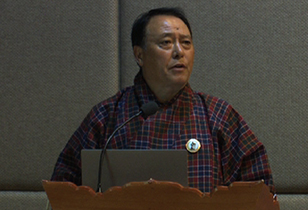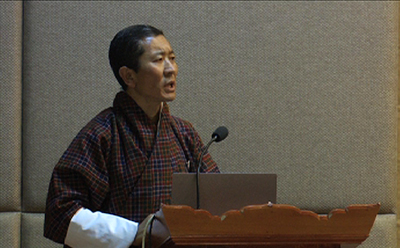 With the commissioning of the Mangdechhu hydropower project, Bhutan’s economy is projected to rebound to more than six per cent this year. This was highlighted in the 2019 Royal Monetary Authority annual report released yesterday.
With the commissioning of the Mangdechhu hydropower project, Bhutan’s economy is projected to rebound to more than six per cent this year. This was highlighted in the 2019 Royal Monetary Authority annual report released yesterday.
Presenting the key highlights of the report, RMA Governor Dasho Penjore, said commissioning of hydropower is important as it is one of the main triggers of economic growth for Bhutan. The report highlighted that economic growth slumped to a low of three per cent in 2018. This was largely driven by a drop in public investment and a decline in hydroelectricity production.
 “Once Mangdechhu is commissioned, we will reach a peak of around 6.7 per cent. But again the issue is sustenance. So what is next after Mangdechhu? Now that is why the government is also putting in a lot of focus on diversification. So we peak through hydropower commissioning then if we want to sustain at that level then other activities has to kick in. So that is why we have comfort that in 2020 the GDP will rebound back to 6.7 per cent with Mangdechu and the flagship projects and CSIs will actually sustain the growth,” said dasho Penjore.
“Once Mangdechhu is commissioned, we will reach a peak of around 6.7 per cent. But again the issue is sustenance. So what is next after Mangdechhu? Now that is why the government is also putting in a lot of focus on diversification. So we peak through hydropower commissioning then if we want to sustain at that level then other activities has to kick in. So that is why we have comfort that in 2020 the GDP will rebound back to 6.7 per cent with Mangdechu and the flagship projects and CSIs will actually sustain the growth,” said dasho Penjore.
The Governor added that while GDP was affected by the delay in hydropower, it was further affected because of the rolling budget of the government to transition from 11th to 12th plan.
Sharing his concerns, Prime Minister said, there is a need to change the way how the five-year plans are planned.
 “One of the reasons for the fluctuations in the spike is the 12th Five-year plan and I feel that it is no more relevant. It has benefitted us immensely before, but now with development, it is important that we do some changes in the 12th Five Year Plan. The activities and programmes that will happen in 2028 have to be planned from the next year. For the 13th plan, we have to start preparing from 2021 and that has to be used till 2028. And we don’t know what kind of developments and technological advancement will happen in 2028,” said the Prime Minister Dr Lotay Tshering.
“One of the reasons for the fluctuations in the spike is the 12th Five-year plan and I feel that it is no more relevant. It has benefitted us immensely before, but now with development, it is important that we do some changes in the 12th Five Year Plan. The activities and programmes that will happen in 2028 have to be planned from the next year. For the 13th plan, we have to start preparing from 2021 and that has to be used till 2028. And we don’t know what kind of developments and technological advancement will happen in 2028,” said the Prime Minister Dr Lotay Tshering.
The report highlighted that the service sector continues to dominate the GDP followed by the industry sector and the agriculture sector.
Sonam Pem








